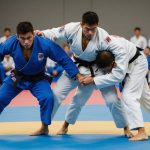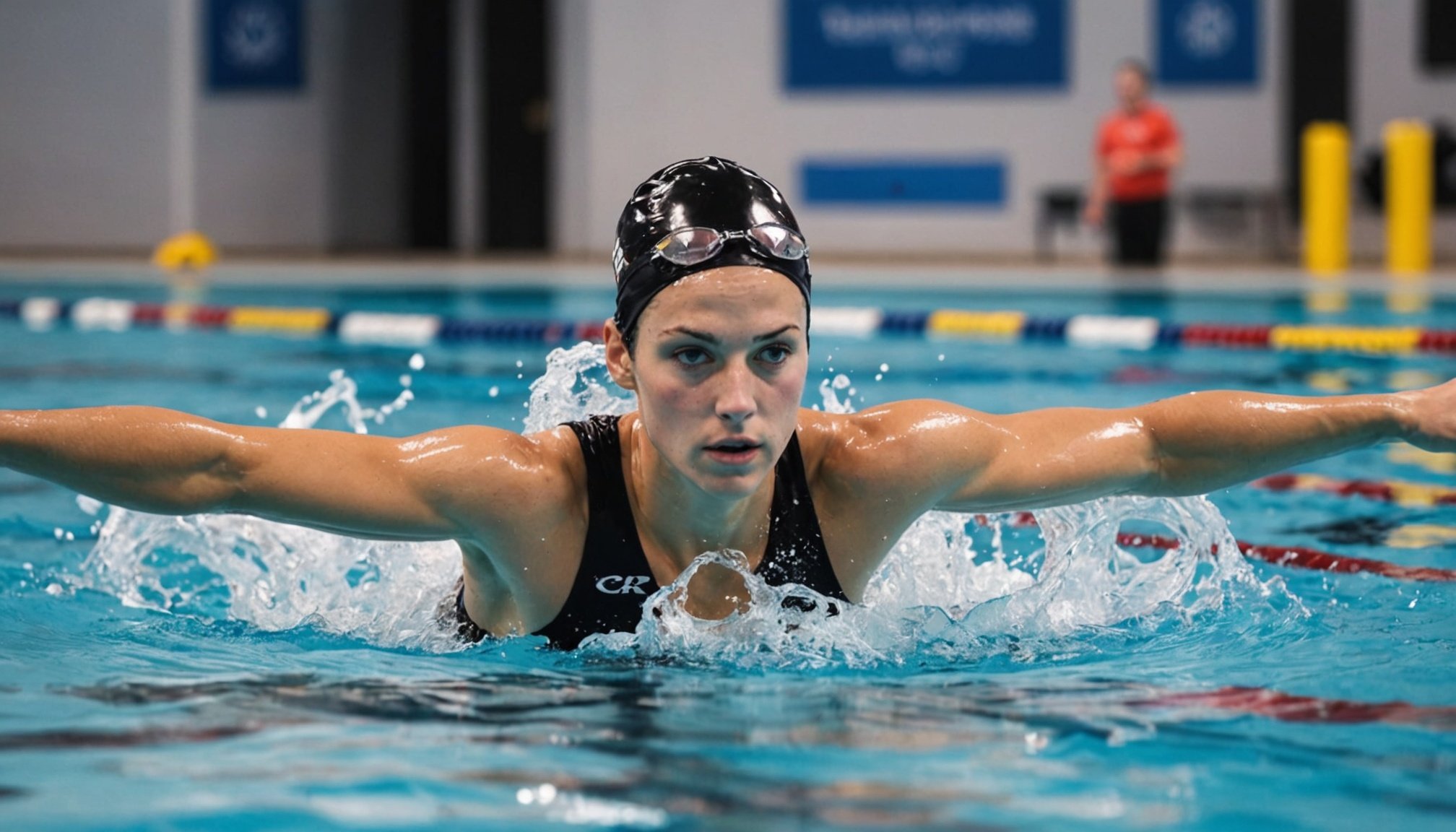Unlocking Potential: The Transformative Impact of Mindfulness Techniques on Competitive Swimmers in the UK
The Power of Mindfulness in Sports Performance
In the highly competitive world of swimming, athletes are constantly seeking ways to enhance their performance and gain a competitive edge. One approach that has gained significant attention in recent years is the integration of mindfulness techniques into training regimens. Mindfulness, often associated with meditation and deep breathing, has proven to be a powerful tool for athletes, particularly in the UK, where the sport is highly revered and competitive.
How Mindfulness Works
Mindfulness involves being fully present and aware of the current moment, without judgment. For swimmers, this can translate into improved focus, reduced performance anxiety, and enhanced overall mental health. Here’s what Dr. Rachel Lindvall, a mindfulness expert and veteran soccer coach, has to say about the benefits of mindfulness:
Also to read : Key Elements of an Effective Recovery Plan for Injured Athletes in the UK
“Mindfulness is so effective at managing stress because it helps athletes develop a greater awareness of their thoughts and emotions. This awareness allows them to better manage pressure and stay focused under intense competition conditions.”
Technical Drills and Mindfulness: A Winning Combination
While technical drills are essential for improving stroke efficiency and physical performance, combining these drills with mindfulness techniques can elevate a swimmer’s game to new heights.
Also to read : Top Strength Training Moves Every UK Football Goalkeeper Should Master
Focusing on Proper Technique
Regular practice of technical drills helps swimmers refine their technique, which is crucial for achieving peak performance. However, when swimmers are mindful during these drills, they can focus more intently on the nuances of their technique, making adjustments in real-time.
For example, a swimmer practicing the freestyle stroke might focus on the alignment of their body, the timing of their arm strokes, and the efficiency of their kick. By being fully present and aware, they can make subtle adjustments that significantly improve their performance.
Here are some key mindfulness techniques that swimmers can incorporate into their technical drills:
- Body Scan: Before starting a drill, take a moment to scan your body, ensuring that you are relaxed and aligned properly.
- Breathing Exercises: Use deep breathing to calm your mind and focus your attention.
- Present-Moment Awareness: Focus on the sensation of the water, the movement of your body, and the rhythm of your breathing.
Mental Performance Coaching: The Role of Mindset in Swimming
Mental performance coaching is another critical aspect of unlocking a swimmer’s potential. Firms like CEP Mindset, founded by Dr. Cassidy Preston, specialize in helping athletes develop the mental skills necessary for consistent elite performance.
Getting into the Zone
Dr. Preston emphasizes the importance of developing practical and personalized strategies to help athletes get into the “ZONE,” a state of optimal focus and performance.
“Break Free from the Weight of Results, Play with Confidence, and Perform When It Matters Most. This is what our coaching is all about,” Dr. Preston explains. “By focusing on mindset first, athletes can overcome performance anxiety and achieve consistent elite performance.”
Cognitive Training and Neurotechnologies
Cognitive training and neurotechnologies are also playing a significant role in enhancing sports performance, including swimming. Tools like NeuroTracker, which focus on perceptual-cognitive training, can improve reaction times, spatial awareness, and overall cognitive function.
The Science Behind Cognitive Training
NeuroTracker works by using multiple object tracking (MOT) to enhance the brain’s ability to process multiple stimuli simultaneously. This can be particularly beneficial for swimmers, who need to be aware of their surroundings, their body position, and the timing of their strokes.
According to Dr. Roman Velasquez, a neurocognitive coach for world-class UFC fighters, “The latest sports neurotechnologies are redefining what it means to develop a competitive edge. By training the cognitive dimensions of sports, athletes can achieve faster reaction times and better decision-making under pressure.”
Practical Insights and Actionable Advice
For swimmers looking to integrate mindfulness and cognitive training into their regimen, here are some practical insights and actionable advice:
Mindfulness in Daily Life
- Start Small: Begin with short mindfulness sessions, such as 5-10 minutes of deep breathing or body scan exercises.
- Make it a Habit: Incorporate mindfulness into your daily routine, just like you would any other training activity.
- Use Guided Podcasts: Listen to guided mindfulness podcasts, such as those available on platforms like New York-based mindfulness apps, to help you get started.
Cognitive Training Programs
- Use NeuroTracker: Incorporate NeuroTracker or similar cognitive training tools into your training program to enhance your reaction times and spatial awareness.
- Focus on Sport-Specific Training: Ensure that your cognitive training is sport-specific, focusing on the unique demands of swimming.
- Combine with Strength Conditioning: Pair cognitive training with strength conditioning to create a well-rounded training program.
Real-Life Examples and Success Stories
Several athletes have seen significant improvements in their performance after incorporating mindfulness and cognitive training into their regimen.
Erin McLeod’s Journey
Erin McLeod, a Canadian Olympic Hall of Fame soccer goalkeeper, shared her story of how mindfulness transformed her career and personal development:
“Mindfulness practice helped me manage stress and stay focused under pressure. It was a game-changer for me, both on and off the field.”
The Impact on Mental Health
Mindfulness and cognitive training not only enhance performance but also have a profound impact on mental health.
Reducing Performance Anxiety
Performance anxiety is a common issue among competitive swimmers. Mindfulness techniques can help reduce this anxiety by promoting relaxation and focus.
“By being more mindful, athletes can better manage their nerves and perform at their best even under intense pressure,” says Dr. Lindvall.
Enhancing Self-Esteem
Mindfulness also helps athletes develop a more positive self-image and higher self-esteem. This is particularly important for young athletes who may face significant pressure to perform.
“Mindfulness helps athletes develop a greater sense of self-awareness and self-acceptance, which is crucial for maintaining good mental health,” explains Dr. Preston.
In the competitive world of swimming, unlocking potential is not just about physical training; it is also about mental preparation and mindfulness. By incorporating mindfulness techniques, mental performance coaching, and cognitive training into their regimen, swimmers can achieve peak performance, reduce performance anxiety, and enhance their overall mental health.
As Dr. Roman Velasquez aptly puts it, “The right type of cognitive training and mindfulness practice can make all the difference in achieving consistent elite performance. It’s about embracing change and using every tool available to unlock your full potential.”
Table: Comparing Different Mindfulness and Cognitive Training Approaches
| Approach | Description | Benefits | Examples |
|---|---|---|---|
| Mindfulness Techniques | Deep breathing, body scan, present-moment awareness | Reduced performance anxiety, improved focus, enhanced mental health | Guided podcasts, daily mindfulness sessions |
| Mental Performance Coaching | Personalized strategies to get into the “ZONE” | Consistent elite performance, confidence, reduced pressure | CEP Mindset, Dr. Cassidy Preston |
| Cognitive Training | Perceptual-cognitive training using tools like NeuroTracker | Improved reaction times, spatial awareness, decision-making | NeuroTracker, Dr. Roman Velasquez |
| Strength Conditioning | Physical training to enhance strength and endurance | Improved physical performance, better overall health | Combining with cognitive training for a well-rounded program |
Detailed Bullet Point List: Integrating Mindfulness into Your Swimming Training
-
Start with Breathing Exercises:
-
Practice deep breathing before and after your swim sessions to calm your mind and focus your attention.
-
Use breathing exercises during your swim to maintain a steady rhythm and reduce stress.
-
Incorporate Body Scan:
-
Before starting your swim, take a moment to scan your body, ensuring you are relaxed and aligned properly.
-
During your swim, periodically check in with your body to make adjustments and maintain optimal technique.
-
Focus on Present-Moment Awareness:
-
Concentrate on the sensation of the water, the movement of your body, and the rhythm of your breathing.
-
Use mindfulness to stay focused on your technique and make real-time adjustments.
-
Use Guided Mindfulness Sessions:
-
Listen to guided mindfulness podcasts or apps to help you get started with your mindfulness practice.
-
Incorporate mindfulness sessions into your daily routine, just like any other training activity.
-
Combine with Technical Drills:
-
Practice mindfulness during your technical drills to focus more intently on your technique.
-
Make subtle adjustments in real-time to improve your performance.
-
Make it a Habit:
-
Incorporate mindfulness into your daily routine, making it a consistent part of your training regimen.
-
Use mindfulness in other areas of your life to enhance overall mental health and well-being.
-
Seek Professional Guidance:
-
Work with mental performance coaches or mindfulness experts to develop personalized strategies.
-
Use cognitive training tools like NeuroTracker to enhance your reaction times and spatial awareness.
By integrating these mindfulness techniques into your swimming training, you can unlock your full potential, achieve peak performance, and enhance your overall mental health.











